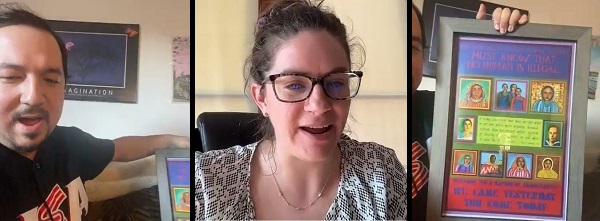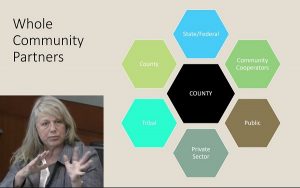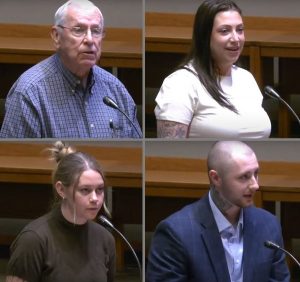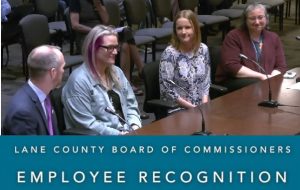Human Rights Commission considers alternatives to proposed parking ordinance
10 min read
The Eugene City Council voted to postpone a vote on higher parking fines for people living in their vehicles. On March 19, Eugene’s Human Rights Commission (HRC) looks for alternatives.
Councilor Lyndsie Leech: I was honored to be able to highlight the work of the HRC and the Homelessness and Poverty Work Group, and also give voice to many of our community members who weren’t able to join the public hearing because they didn’t know that this code that was so impactful to our homeless response would be hidden in some parking code.
[00:00:34] And I was really concerned that we were going to let that pass by without hearing those voices. And so we were able to take a pause.
[00:00:43] If you’re able to look at the tentative agenda, you’ll see that there’s a (To Be Determined) work session on April 10. I believe that they’re going to try to put our next work session on this topic in that April 10 opening, which means I have very limited time to craft kind of a different set of expectations for what that code looks like.
[00:01:06] A lot of the community has been asking and I’m asking: ‘How much are we really spending on our unhoused response?’ I want (the answer) to come specifically from staff to say, ‘Here’s what we’re spending.’ And try to reallocate some of that money to fund additional parking and shelter services.
[00:01:29] Also looking at: Can we explore the vacancy tax? Can we explore some other items to increase our services? And of course, we have a lot of state funding and things coming down.
[00:01:39] But really, until we get enough shelter space and enough legal places for people to be, it’s just unconscionable to me to criminalize it further. So we’re going to do everything we can to come up with something else.
[00:01:52] I’m interested in hearing a little bit more of a discussion tonight on what would you do if you were in my position and how can I then bring that to staff and create something that’s going to be more effective.
[00:02:08] Blake Burrell (Human Rights Commission): Councilor Leech, the parking policy discussion on Chapter 5 amendments has been something that was weighing heavily on our work group, so to have that voice amplified in the City Council meeting was very meaningful to us, so we appreciate your presence and ongoing engagement on issues impacting the unhoused community…
[00:02:26] So we’re focusing on recommendations around the Chapter 5 amendments.
[00:02:32] Scott Lemons (Human Rights Commission): I really want to appreciate you, Councilor Leech, for being a human rights advocate. Thank you for tabling that conversation so it can be more discussed about why are we punishing the unhoused, they cannot pay the fines anyways, it is very antithetical to anything we’re trying to achieve. It’s certainly a dereliction of duty and it’s more of a band -aid than it is a solution. Certainly not a cure. And the people who are suffering from being unhoused and also the rent-burdened deserve a solution and that’s why I am here and I loved your statement…
[00:03:16] The biggest thing I’m worried about is please do not use the Americans With Disabilities Act against people with disabilities.
[00:03:24] More than 70% of people who are homeless are disabled and for someone to have to clear out their camp in 48 hours if they happen to reside, like, temporarily on a park.
[00:03:37] Like, I’m sorry, I have a mental health disability and I cannot figure that out, let alone someone who has to maneuver a wheelchair and everything else. And if that is not accomplished on their part within 48 hours, all of their stuff is confiscated to a place where they can’t get to.
[00:03:57] So I understand, the city has a lot of things that they have to accomplish. They have to look out for a lot of different interests. But if you’re going to accomplish this and do this, please don’t do it in the American with Disabilities Act name, because you are literally using our community against ourselves.
[00:04:18] Demond Hawkins (Human Rights Commission): When you pushed back on this particular ordinance that was going forward, the follow-up that came back was that they were more concerned about RVs and bigger vehicles like that blocking. But from what this reads, it doesn’t read like it’s about that. It seems to be like all-encompassing.
[00:04:41] Councilor Lyndsie Leech: Forty RVs have been deemed problematic. And so for me, why would we create an entire ordinance around all vehicular camping, when we’re saying that the problem really is these 40 or so RVs that might be in different states of disrepair or dangerous with their propane or their sewage or some problematic things.
[00:05:06] And is it just cheaper for the city to help these people? Can we help with repair? Can we connect them to resources that are going to help move their vehicle on? Can we give them a jump rather than towing their vehicle?
[00:05:21] And I would like us as a city to have that compassionate side of the equation to be able to do those things and figure out what the blockage is.
[00:05:32] And then on the other side, can we find these 40 or so vehicles RVs a place to be? And so that if they are able to have their vehicle in a safe legal place, and they choose not to at that point, then some kind of enforcement would be more appropriate—if they’re refusing help.
[00:05:56] Apparently some businesses have been willing to open up a parking lot for the night to help with the situation. And they have said that there have been some roadblocks from the city. So I’d like to try to address what those are, allowing private businesses—or even, you know, churches or nonprofits—the ability to open their own night safe sleep sites. And reallocate funding to support something like that.
[00:06:26] Scott Lemons (Human Rights Commission): Even if the city has to tow RVs to a safe spot, that is still a lot cheaper than doing all the enforcement stuff and the enforcement stuff will never work.
[00:06:38] Don’t ask poor people to pay what they can’t, you know. So, please consider other options, especially like—I think it’s really cool—like, please tow these inoperable RVs to a place where they can still live. What an idea.
[00:06:58] Dr. Silky Booker (Human Rights Commissioner, March 19, 2024): We’ve got to look at this whole picture of how this thing is created, right? The state gets money for the homeless issue. The homeless have to be in city limits near these facilities that provide these services that the state is getting money to help the homeless. So without the homeless around, the state isn’t getting the funding to help the homeless.
[00:07:21] One thing that I don’t see being realized is the tax-exempt churches. Why can’t an ordinance be done to where, when church isn’t happening, these RVs are parked? ‘Cause a lot of these churches have huge parking lots, probably more than they need. They’re tax-exempt, they’re supposed to be helping the needy, so why isn’t more being done to force these churches who are tax-exempt to help the homeless?
[00:07:52] Commissioner Thomas Hiura: In addition to the conversation about whether it’s forcing or encouraging or developing stronger linkages with nonprofits and faith groups that might be able to take on some of this opportunity to help, I think that we suffer from a lack of community cohesion and information. I think there’s a lot of people that might want to help and they don’t know. So there might be a lot of church organizations that would like to participate voluntarily and support it.
[00:08:19] I really just kind of chimed in here on this conversation for, to say a couple of quick things. I really appreciated Councilor Leech’s leadership at the most recent council meeting. And I feel a greater sense that our alignment, which has been a goal of ours in HRC, is relevant to what Council’s working on. And so that is a credit to a lot of, you know, city staff and you and so many of us…
[00:08:43] So yeah, the message I want to send to those communities isn’t one of punitive engagement. The message I want to send is about uplift, collaboration, and communally creating solutions to these issues. So appreciate the opportunity to get a good chance to dive in on this.
[00:09:01] Blake Burrell (Human Rights Commission): As many as you know, I work in homeless emergency services. I’ve had the ability to work on administrative teams operating RFPs (Requests For Proposals) for parking programs through the city of Eugene and Lane County. So I understand the administrative aspects, the direct service components, and the cost structure, and also the implications of some of the recommendations within the code that were proposed.
[00:09:27] So I will start with a couple of the policy pieces and then reflecting some programmatic suggestions that I think we could explore and then utilize our Homelessness and Poverty Work group to actually generate a recommendation.
[00:09:41] So the 5.225, Prohibitive stopping, standing and parking, Section 8, looking at stormwater drainage systems. There was part of the public comment specifically identifying spaces where folks who are engaging in RV camping could know where to dump graywater so that there wouldn’t be an environmental impact. So I think that we could explore, instead of an immediate impoundment, an outreach effort that helps those individuals identify locations for releasing graywater.
[00:10:11] So I don’t think immediate empowerment is ever a resolution for supporting an individual who’s experiencing homelessness or preventing encampments. I don’t think it’s an appropriate recommendation.
[00:10:21] When we’re looking at financial penalties, so 5.990, we’re looking at an increase here in Section 2 of $100 to $500. And then additional in Section 3, a violation of EC 5.225(1)… ‘punishable by fine not to exceed $1,000.’ A violation (looking at Section 4) is a ‘fine not exceeding $200.’
[00:10:46] So everything that we’re looking at in the financial category is increasing by a very significant amount for individuals who, if you look at the data provided by the Oregon Law Center, I think it’s like eight out of 10 of those individuals if not more are already not paying the current fines that are being administered. So I don’t think increasing those fines by tenfold makes any sense.
[00:11:10] So when we’re looking at that, both impoundment and increase of fines only creates more barriers to housing. So when you’re using city-funded or county-funded programs to fund case managers or service navigation increasing those financial barriers, especially when interest is applied, will not help the city or county with its goals for housing.
[00:11:31] Increasing financial penalties only causes individuals experiencing homelessness to accrue more debt, which creates more barriers, financial barriers, to housing. So I don’t think that this is an appropriate mechanism for enforcement.
[00:11:44] A couple of programmatic suggestions.
[00:11:47] The ‘Safe Parking’ program’ is an overnight parking program from 5 p.m. to 7 a.m. that’s funded by Lane County. An individual can get a permit to park overnight and then during the day they have to leave.
[00:11:59] That program is currently losing funding. St. Vincent De Paul will not be funding it after the 31st of this month. So that is a very cost-effective program. My conversations with their organization, it’s a cost of almost $5 a night. I believe the exact cost is $5.87 a night.
[00:12:20] So over the course of a year, the cost of this program was under $100,000 to provide shelter options. So I really think exploring a recommendation for the city of Eugene to sustain funding in a Safe Parking program would make sense.
[00:12:36] A lot of those folks are employees that are using that to shelter overnight, then driving to their respective places of work during the day so they would avoid citation.
[00:12:45] I think losing the Safe Parking program would be a significant loss for our crisis response system. So if we can examine the RFP and talk about integrating that into our homeless services sector, I think it would make a lot of sense.
[00:12:57] John Q: Suggesting one more initiative:
[00:13:01] Councilor Lyndsie Leech: A work session request on emergency response and emergency management to learn more about how we’re preparing our city and becoming more resilient. But within that, including the memo that you all have drafted around inclement weather, and how we respond to removal of camps during different weather events.
[00:13:23] And so just talking more in depth about all of the different components of like, if we have an ice storm: What’s our system? And how are we making sure that the most vulnerable people in our community are safe and not as impacted by some of these events?
[00:13:40] John Q: Councilor Lyndsie Leech and the Human Rights Commission endorse public comment about providing places for RV graywater disposal. They may ask the city to remove barriers to using private parking lots for overnight camping. And with St. Vinnie’s losing funding, the HRC may ask the city to adopt their low-cost ‘Safe Parking’ program. The council could take up the parking ordinance again as soon as April 10.
Image: Eugene City Councilor Lyndsie Leech; Human Rights Commissioner Thomas Hiura displays art from the Catholic Community Services Refugee and Immigrant Services (RISP) Gala that reads: “You who are so-called illegal aliens must know that no human is illegal” and “Welcome to a nation of immigrants. We came yesterday, you come today.”



